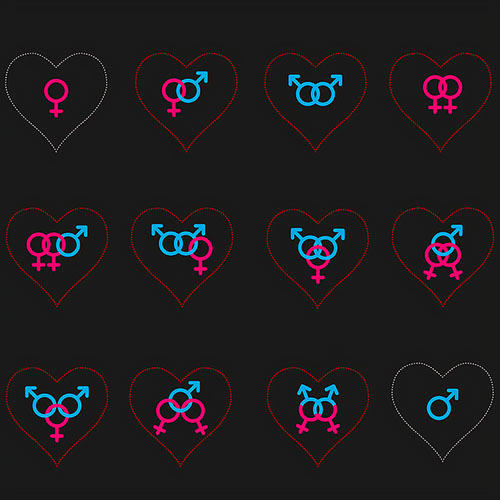There is a silent majority of women in America who know men are not their enemy.
Feminism’s Wrong Turn
These women have been given voice by two newspaper columnists who call themselves “dissident feminists”: Cathy Young, who appears in the Boston Globe, and Robyn Blumner, of the St. Petersburg Times and a syndicated columnist for Tribune Media Services. For Young and Blumner, the current women’s movement has betrayed its noble purpose. In the 1960s, after Betty Friedan’s explosive book The Feminine Mystique challenged the attitudes that kept women at home, equality was the clarion call of feminism. Women wanted the same opportunities as men to fulfill their ambitions. But something funny happened, once the deed was accomplished — the goals suddenly changed.
Today’s feminists, represented by groups like the National Organization for Women and women’s studies researchers on college campuses, may claim their goal is still equality for women and men, but their actions indicate otherwise. On issues ranging from domestic violence to sexual harassment to divorce, the women’s movement wants the law and society to view men as villains and women as victims. As Young writes in her book, Ceasefire! Why Women and Men Must Join Forces to Achieve True Equality (Free Press), the focus of feminist activism has shifted from “women’s rights to women’s wrongs.”
And that is where Blumner and Young part company with today’s feminist movement. Their brand of feminism views men and women as individuals, to succeed or fail as their talents, interests, and abilities allow. They reject the tendency of radical or “victim” feminists to project onto all men the evil that a small proportion do to women. For Blumner and Young, neither gender has a monopoly on virtue or villainy. Human relationships are as complex and varied as the individuals who form them.
Here, Young and Blumner converse about feminism’s wrong turn.
Blumner: Feminism has shifted from a movement about equality to one which seeks to give women a legal advantage. I think that’s because some women found equality to be a difficult prospect. It’s not easy competing every day in a workaday world. And equality doesn’t guarantee happiness; it just offers opportunity.
Young: One of the mistakes a great many feminists made was to assume that basically men were perfectly happy and could do whatever they wanted, which is certainly not true. If you look at the vast majority of men historically, that was never the case. And to the extent that there was a great deal of male privilege, I think it came with a great deal of responsibilities and a great deal of burdens.
Blumner: And risks.
Young: Yes, and risks. And I think a lot of feminists never really recognized that, because what they focused on was not so much equality as the suffering of women. I think for a lot of feminists the belief that men and women should be treated as individuals has given way to the notion that feminism is about solidarity with women, which means in any kind of given legal case you automatically take the woman’s side, whether it’s custody or sexual harassment or rape.
Blumner: But the purpose of that solidarity was to get society to stop judging women on the basis of their chromosomes and treat them as individuals. Now the feminist movement has abandoned that goal. Victim feminists want gender to be taken into account so women can be preferred in such matters as child-custody cases, hiring decisions, and domestic-violence disputes.
Young: And I think we also shouldn’t forget that there were a lot of men who supported the feminist movement in its claims for equality.
Blumner: Since women had little access to formal power, much of women’s legal equality was obtained by the grace of male judges, male state legislators, and male congressional representatives. I’ve always said, “Give me a William Brennan on the United States Supreme Court over a Phyllis Schlafly any day.” Now, unfortunately, with much prompting by today’s feminists, the scales are moving beyond equality and are tipping in favor of gender-based preferences — for example, rape-shield laws that keep the sexual history of the alleged victim out of sexual-assault trials but allow the defendant’s past to be brought in.
Young: It’s useful to look at the history of rape-shield laws, because they started out with good intentions. If you go back to before the 1970s, there was a notion codified in law that if a woman had a sexual history not conforming to the conventional notion of female chastity, this made her less credible if she claimed she was raped. She might find herself on the witness stand being asked, “Have you ever had a relationship with a married man?” or “Is it true you were on the birth-control pill at the time?” All of these questions were completely irrelevant to the specific accusation of rape she was making. That information was simply being used to compromise her and suggest she was less credible because she was a slut, essentially.
But the problem is, [given] the way the rape-shield laws are being applied today…, any information pertaining to the sexual history of the woman can be suppressed, even if it bears very directly on something about the case. There’s that Oliver Jovanovic case in New York. This is the “cybersex” case, where the female Barnard College student got on the stand and falsely told the jury she had never in her e-mail correspondence with Jovanovic expressed any interest in S&M activities. And, in fact, a number of e-mails where she had expressed such interest were suppressed by the judge under the rape-shield law.
“Women have been persuaded… that they are demeaned and degraded if sexual humor or banter goes on in the workplace.”
Blumner: There is also a tendency in society in general to protect the woman’s identity in cases of alleged rape, but not the man’s. For example, many newspapers will routinely print the name of the accused in a sexual-assault case but will not print the name of the accuser, suggesting a couple of things — one, that the woman is telling the truth that she was raped and about who did it; and two, if the accuser’s name were known, the woman would be considered damaged goods, reinforcing an atavistic societal stereotype. Ironically, the only way to eradicate the stereotype is to present the victim of a sexual assault as if she were the victim of any other crime, the opposite of what newspapers do.
I’m also very concerned about how the definition of rape is shifting from a woman who is physically forced into sex to a woman who is hounded into sex or agrees to it when intoxicated. Of course, this is not the legal definition of rape, but victim feminists call it such.
Young: Obviously, the law recognizes that if you have sex with somebody who has passed out, that’s considered rape, and I don’t have any problem with that. The problem is that this has been extended to cases in which the person may be intoxicated but is certainly nowhere near unconscious. An example in my book is a letter to Ann Landers in which a woman says, “I met this guy in a bar and we really liked each other, and then went back to his place and had a couple more drinks, and then one thing led to another and before I knew it we ended up in bed, and then the next morning I felt really ashamed. And then when I told a friend about it, and my friend is a paralegal, she said, ‘Oh, well, you were drunk, so you’re not really responsible for this and you were raped.’” And the woman writing the letter actually said, “Well, I don’t really think so. It certainly doesn’t feel like rape to me. What do you think?” And Ann Landers actually replied, “Yes, if you’re intoxicated and somebody has sex with you, they’re committing rape.” Which is not legally accurate. So here’s Ann Landers, who is supposed to be the voice of common sense and conventional wisdom, encouraging the belief that if you have sex with somebody when you are tipsy, you can deny all responsibility for your behavior and say that you were raped.
Blumner: Again we see feminists reinforcing the notion that women are unable to make decisions regarding sex for themselves, and that men are always the sexual aggressors. Both are views that I believe are antithetical to women’s equality as well as being patently false.
Young: And of course nobody would ever say that if a man has sex with a woman when he is intoxicated, she’s committing rape. Some of the feminist literature I’ve seen that gets distributed on campus basically promotes the notion that even if you’re already in a sexual relationship, you have to obtain explicit consent to every sexual act before you proceed, and that if you proceed without explicit permission, even if you’ve had sex a hundred times before, this is rape. It seems to me the only thing that can do is kill any possibility of any kind of spontaneous relationship.
Blumner: You have written extensively about the growth of sexual-harassment law, saying it “has grown like the Blob, swallowing up trivial or ambiguous acts, sexual jokes, compliments, leers, requests for dates, and spreading over an ever-wider range of interactions between men and women who work and study together.” Why do you think women are willing to let this Blob grow?
Young: Well, you know, that’s really a good question. I’ve kind of wondered about that myself.
Blumner: I mean, it codifies women as the weaker sex in need of legal protections against the indelicacies of men. It undermines, as opposed to advances, an equal-work environment where women are included in the dirty jokes and made to feel like part of the group. Instead, victim feminists want to erect a Victorian-era wall between women and their male colleagues.
Young: I think a lot of women have unfortunately bought into the victim mentality. Women have been persuaded by the media, by women’s magazines, by so-called women’s advocates, that essentially, they are demeaned and degraded if sexual humor or sexual banter goes on in the workplace. It overlaps with some of the traditional notions about sexuality that a lot of women, even in our day, are still being raised with-basically the notion that if you’re being treated as a sexual being, somehow you’re disrespected.
Blumner: Or viewed as less competent in the workplace because you are also sexually attractive.
Young: In a way, it’s a reincarnation of the Victorian madonna/whore [dichotomy] — you know, that you can be either the virtuous woman who is respected and sexless or the woman who is sexual and nothing else.
Blumner: What I don’t understand is why feminism doesn’t respond to that concern by saying to women, “Stand up for yourselves and don’t accept that false dichotomy. And if there’s someone pestering you, speak up and confront them.” Instead, what modern feminists say is, “It’s true, you can’t be seen as both professionally accomplished and attractive. And if you’re viewed as the latter, run to the law, the law will shield you. Bring a lawsuit, make a federal case out of it.” I think this attitude is highly corrosive of the goodwill men and women should have toward one another as coworkers.
Young: One thing that I find interesting, and in a way disturbing, is that men are catching on to this game.
Blumner: True. When men get fired now and they want to find some legal avenue to get their job back or punish their employer, all they have to do is pick out times and places where a female coworker or supervisor said something they found offensive.
Young: There was a case in New Jersey where a male correctional officer won a huge amount of money — I think it was $10 million — because he was being sexually harassed by a female colleague. Apparently she was interested in him sexually, and he was married and told her he was not interested in having an affair. She was not his supervisor, so there is no indication she could penalize him for refusing to have sex with her. He won the case because the supervisors told him to resolve the situation on his own and refused to do anything to discipline the woman.
I suppose one can disagree as to whether or not they should have told her to leave the guy alone, but I certainly don’t think their failure to do that constitutes grounds for a huge award, or for any kind of award, as far as I’m concerned. It seems to me that a grown-up — man or woman — should be able to deal with unwanted sexual attention.
“I think a lot of women don’t realize that these sorts of anti-male attitudes actually pose a real danger to the men they love.”
Blumner: Nor is it all that comforting that our federal courts are being drawn into these rather petty sexual interplays.
Young: Ultimately, it’s the taxpayer who is penalized by both the litigation costs and [court time used]. The only people who are really winning, apart from plaintiffs, are people working in the sexual-harassment industry. A lot of the sexual-harassment training that goes on in the workplace actually takes an even broader view of sexual harassment than the courts do, because, at least theoretically, the law requires that harassment be “severe and pervasive” for there to be a finding of liability. In a lot of work-place training they dispense with the “severe and pervasive” requirement and treat a single unwanted or maybe even a not-unwanted sexual joke as sexual harassment. In one of those harassment-training scenarios, two men and a woman have shared an office for some time and had a habit of trading sexual jokes and sexual banter. Then another woman comes to work for the company, is given a desk in the same office, and she happens to not like sexual humor and finds sexual banter offensive. And the only correct answer in that sexual-harassment training course is that the two men and the woman who have done this for years, maybe, and who have this long-established dynamic between them, have to be told to completely stop all the sexual talk and not say anything that might be offensive to this new woman. What this seems to say is that a newcomer has the right to come into an office and dictate her own terms to people who have been working there for God-knows-how-many years. What may be happening through the courts is that people who sit on the jury in a sexual-harassment case, [and] have been through sexual-harassment training at the place where they themselves work, may actually apply to a legal case the extralegal definition of sexual harassment they may get in these training workshops.
Blumner: Employers are in a true quandary here. I understand their impetus for bringing in experts to train their employees. The Supreme Court has made it very clear this kind of training is essential.
Young: It’s the only way they can avoid being sued.
Blumner: Exactly. And so employers who are risk averse are going to make sure their sexual-harassment policies encompass even the most innocuous interactions. There really is no counter-vailing pressure to move employers back to the center.
Young: Several years ago the Equal Employment Opportunity Commission was considering guidelines on religious harassment modeled on sexual-harassment guidelines. Then some people caught on to the fact that if these guidelines were actually passed, it would mean you couldn’t discuss religion in the workplace. You couldn’t have a bible in the workplace because the introduction of any kind of religious themes would be regarded as harassment, much as the introduction of any sexual themes in the workplace is regarded as sexual harassment today. Of course what happened then was a lot of religious leaders spoke out and said we really have to make sure that while the law should protect people from being harassed on the basis of their religion, it should also allow for things like the discussion of religion in the workplace and allowing people to express their religion in the workplace.
Blumner: Right. And ultimately the regulations were trashed. They were never adopted.
Young: And that was because people were going to stand up against them. I think the problem is not that many people are going to stand up and openly say, “I want my freedom to tell sexual jokes in the workplace.” So, in a way I think it has to do with the attitudes we have toward sex and sexual issues.
Blumner: One area of modern life where the war of the sexes is perhaps most raw is in divorce and child custody. Victim feminists tell us that, economically, women suffer much more during a divorce, and that they often rely, as you noted in your book, on researcher Lenore Weitzman’s inaccurately calculated and now-repudiated statistic, that a woman’s standard of living dropped 73 percent after divorce and a man’s was raised 42 percent. What is the truth with regard to divorce? Who benefits? Who loses?
Young: The conventional view that women take a very severe hit from divorce and men make out like bandits is certainly wrong. But it fits popular stereotypes. Both conservatives and liberals attempt, for different reasons, to adopt this view of women as being victimized by divorce. A lot of conservatives have this view that men are naturally promiscuous, and that if you give them a chance, they will abandon their families and run off and chase nubile blondes. Feminists have a stake in portraying women as victims because that’s their stock in trade.
Often, the calculations on the economic impact of divorce that feminists rely on fail to take into account a lot of important factors, including the money a noncustodial father spends on his children for things like food, gifts, entertainment. Also not considered is the money he spends to move out of the house and start over. And the most important factor left out is taxes. The tax code in many ways favors the custodial mother. If you just take taxes into account, the mother’s standard of living actually goes up slightly and the father’s declines slightly.
Blumner: I’ve always thought a high divorce rate is a good indicator that women are approaching equality in society. I think it’s indicative of women’s economic independence. It means they have choices beyond relying on their husbands for survival or status.
Young: And the conservatives who portray women as victims of divorce tend to ignore the fact that two thirds of divorces are initiated by women.
Blumner: What about this idea that conservative authors like Wendy Shalit and Danielle Crittenden are putting out there, that women should withhold sex until marriage as a way to eliminate male flight from the obligations of marriage and family?
Young: First of all, I disagree with the notion that there is a male flight from the obligations of marriage and family. Obviously, the view that men are not going to get married if sex is available to them outside marriage is refuted by the fact that there are millions of marriages taking place every year, and today sex is available to the vast majority of men outside marriage.
Also, no self-respecting woman would marry a man who wants to marry her just because he can’t get laid any other way. I don’t think that’s a foundation for marriage.
Blumner: So many of the shibboleths about men being bad and women being good, women being victims and men being oppressors, are inaccurate. Even so, popular culture is full of such images, as in the television show Men Behaving Badly. The theme seems to have resonance. Is this just made up by Hollywood, or are there some fundamental truths here?
Young: I don’t think it’s entirely made up by Hollywood. I do think there are inevitable tensions between men and women, because sexual intimacy is rife with potential for conflict and tension simply because it involves some very strong emotions. The problem we have today is that for the most part it’s acceptable for women to vent their frustrations with men in a way that is not acceptable for men to vent their frustrations with women. The frustrations that women have about men tend to be very politicized.
Blumner: By victim feminists who tell women, “If your boyfriend is behaving like a jerk, it’s because men are oppressors, and the law should react to protect you from that.” As if women can’t also be jerks. What I don’t understand is why women tolerate all this male bashing. After all, millions of American women are happy in marriages, have sons, fathers, brothers, and friends they love and respect.
Young: I wish I had an answer to that. I think a lot of them have been persuaded to believe that women have been oppressed by men for thousands of years, so turnabout is fair play. And I think a lot of them don’t realize that these sorts of anti-male attitudes actually pose a real danger to the men they love.
























